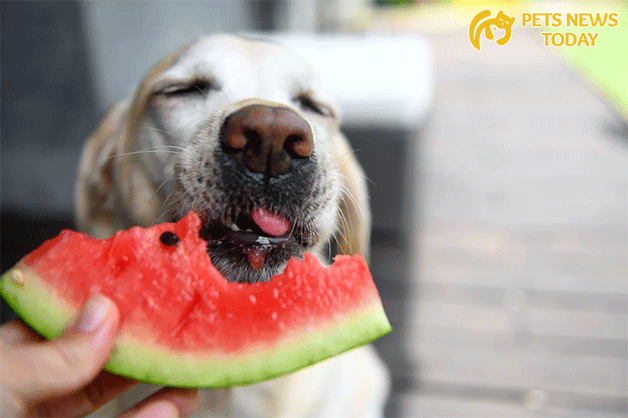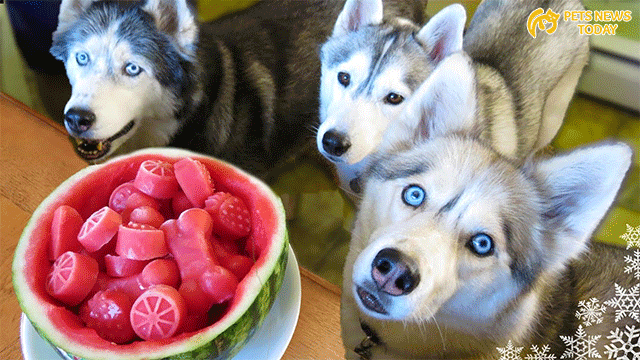Can Dogs Eat Watermelon? – What Every Pet Owner Should Know

As devoted pet owners, we often find joy in sharing our meals with our furry companions. Watermelon, with its refreshing taste and high water content, is a summertime favorite for many humans. But can dogs enjoy this juicy fruit as well? In this comprehensive guide, we’ll explore whether dogs can eat watermelon, its potential benefits, and any risks associated with feeding it to our canine friends.
Are Watermelons Safe for Dogs?

Yes, dogs can eat watermelon. Watermelon is generally safe for dogs to consume in moderation. It’s a hydrating fruit that can provide essential vitamins, minerals, and antioxidants to support your dog’s overall health and well-being.
Benefits of Watermelon for Dogs:
- Hydration: Watermelon is composed of over 90% water, making it an excellent source of hydration for dogs, especially during hot summer months. Proper hydration is crucial for maintaining healthy organ function and regulating body temperature in dogs.
- Vitamins and Antioxidants: Watermelon contains vitamins A, C, and B6, as well as antioxidants such as lycopene. These nutrients can support your dog’s immune system, promote healthy skin and coat, and reduce the risk of chronic diseases.
- Fiber: Watermelon contains dietary fiber, which can aid in digestion and promote regular bowel movements in dogs. Adequate fiber intake is essential for gastrointestinal health and can help prevent constipation and other digestive issues.
- Low in Calories: Watermelon is relatively low in calories compared to other fruits, making it a suitable snack option for dogs, especially those on a weight management plan. However, it’s essential to monitor your dog’s overall calorie intake and adjust their diet accordingly.
How to Let Dogs Eat Watermelon:

- Remove Seeds and Rind: Before offering watermelon to your dog, be sure to remove all seeds and the outer rind. Watermelon seeds can cause intestinal blockages or choking hazards, while the rind may be difficult for dogs to digest.
- Offer in Moderation: While watermelon is safe for dogs, it should be given in moderation as a treat rather than a primary food source. Too much watermelon can lead to digestive upset or diarrhea in some dogs due to its natural sugar content.
- Fresh and Plain: Serve fresh, plain watermelon to your dog without any added sugars, salt, or seasonings. Avoid giving them watermelon-flavored products or candies, as they may contain ingredients that are harmful to dogs.
- Monitor for Allergic Reactions: Like any new food, monitor your dog for signs of allergic reactions or adverse effects after consuming watermelon. Common symptoms may include itching, swelling, vomiting, or diarrhea. If you notice any unusual symptoms, consult your veterinarian promptly.
Potential Risks and Precautions:
- Obesity: While low in calories, excessive consumption of watermelon can contribute to weight gain in dogs, especially those prone to obesity. Monitor your dog‘s portion sizes and overall calorie intake to maintain a healthy weight.
- Digestive Issues: Some dogs may experience digestive upset or diarrhea after eating watermelon, especially if they consume large quantities or have sensitive stomachs. Introduce watermelon gradually into your dog’s diet and monitor their response.
- Choking Hazard: As with any fruit, there is a risk of choking if dogs consume large chunks of watermelon without chewing them properly. Cut watermelon into small, bite-sized pieces or mash it to reduce the risk of choking.
In conclusion, watermelon can be a healthy and refreshing treat for dogs when served in moderation. It offers hydration, vitamins, antioxidants, and fiber that can support your dog’s overall health and well-being. However, it’s essential to remove seeds and the rind, offer it in moderation, and monitor your dog for any adverse reactions. As always, consult with your veterinarian before making significant changes to your dog’s diet, especially if they have any underlying health conditions or dietary sensitivities. With proper care and attention, you can safely incorporate watermelon into your dog’s diet and provide them with a delicious and nutritious treat.
This comprehensive guide on “Can Dogs Eat Watermelon?” provides valuable insights and practical tips for pet owners, ensuring that you can make informed decisions about feeding watermelon to your furry friend.




